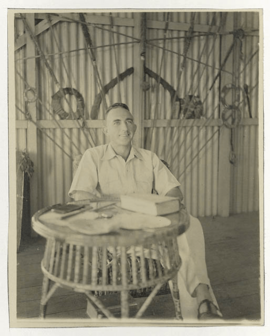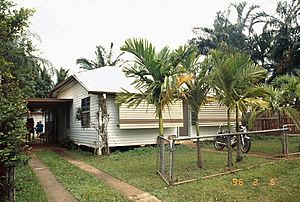Xavier Herbert facts for kids
Quick facts for kids
Xavier Herbert
|
|
|---|---|

On 1 April 1938, the day he received news of winning the Sesquicentenary Library Prize
|
|
| Born | Alfred Jackson 15 May 1901 Geraldton, Western Australia, Australia |
| Died | 10 November 1984 (aged 83) Alice Springs, Northern Territory, Australia |
| Pen name | Xavier Herbert, E. Norden, Herbert Astor |
| Occupation | Author |
| Nationality | Australian |
Xavier Herbert (born Alfred Jackson; 15 May 1901 – 10 November 1984) was an important Australian writer. He is most famous for his novel Poor Fellow My Country (1975), which won the Miles Franklin Award. This award is one of Australia's top literary prizes. Herbert also wrote many short stories and an autobiography called Disturbing Element. He is seen as one of the most significant figures in Australian literature.
Contents
Early Life and Writing Journey
Xavier Herbert was born Alfred Jackson in Geraldton, Western Australia, in 1901. His parents were Amy Victoria Scammell and Benjamin Francis Herbert. Before becoming a writer, he worked many different jobs. His first job was in a pharmacy when he was just fourteen.
He studied pharmacy at Perth Technical College. On 21 May 1923, he officially became a pharmacist. He then moved to Melbourne and later started studying medicine at the University of Melbourne in 1935. Herbert began his writing career by creating short stories. He published these stories in popular magazines and newspapers. He often used different pen names, with "Herbert Astor" being one of the most common.
First Major Novel: Capricornia
Herbert's first book, Capricornia, was published in 1938. He wrote much of this novel in London between 1930 and 1932. The story was partly based on his own experiences. He had worked as a Protector of Aborigines in Darwin, Northern Territory. In 1939, Capricornia won the ALS Gold Medal. This award recognized it as Australia's Best Novel of that year.
Later Works and Achievements
The 1940s and 1950s were quieter years for Herbert in terms of new books. He released Seven Emus in 1959. In the 1960s, he published two more books. Then came his longest and most famous novel, Poor Fellow My Country, in 1975. This book is the longest Australian novel ever written. He also published a collection of short stories during this time.
Herbert was well known for speaking his mind. He strongly supported Aboriginal peoples, especially those living in missions. He was considered a difficult person in his private life. His wife, Sadie, once said she had to choose between having children and taking care of Xavier. He also enjoyed telling different, sometimes unreliable, stories about his past. This made it hard for people writing about his life.
Final Years and Legacy
By 1982, Herbert was a widower and working on a new novel called "Me and My Shadow." In 1983, he toured his home state of Western Australia. He gathered ideas for his new book during this two-month trip.
On 15 January 1984, at 83 years old, he left his home in Redlynch, Queensland. He drove his Landrover 2,000 kilometers to Alice Springs in the Northern Territory. In June 1984, Herbert turned down an award from the Order of Australia. He refused it because he felt it was a British Empire honor, not a truly Australian one.
In September, Herbert received medical treatment in Alice Springs. He was visited by famous artist Sidney Nolan and his wife. After his treatment, Herbert stayed with his doctor's family. He lived there for the last few weeks of his life.
Xavier Herbert passed away on 10 November 1984, due to kidney failure. The Prime Minister, Bob Hawke, honored him as "a prodigiously committed Australian." Herbert was buried in Alice Springs. His wife's ashes were buried with him. An Aboriginal activist, Pat Dodson, led the ceremony. This recognized Herbert's long support for the rights of Aboriginal Australians.
Published Books
Novels
- Capricornia (1938)
- Seven Emus (1959)
- Soldiers' Women (1961)
- Poor Fellow My Country (1975) – Won the Miles Franklin Award in 1975
Short Story Collections
- Larger than Life (1963)
- South of Capricornia (1990) – Edited by Russel McDougal
- Xavier Herbert (1992) – Edited by Frances de Groen and Peter Pierce
Non-fiction Works
- Disturbing Element (1963) – This is his autobiography, telling his life story.
- Letters (2002) – Edited by Frances De Groen, Laurie Hergenhan
- Letters from Xavier Herbert, 1980–1983 (unpublished), By Peggy Hayes
 | Toni Morrison |
 | Barack Obama |
 | Martin Luther King Jr. |
 | Ralph Bunche |



